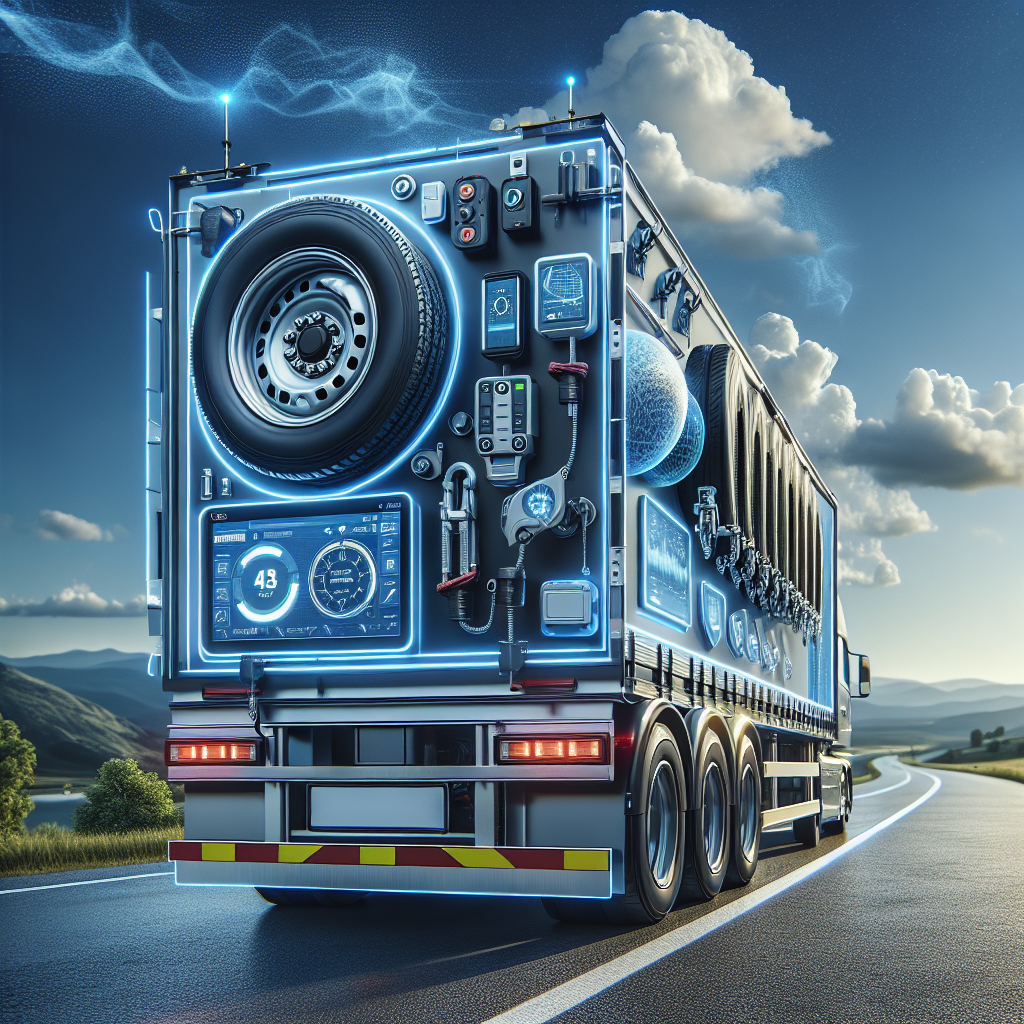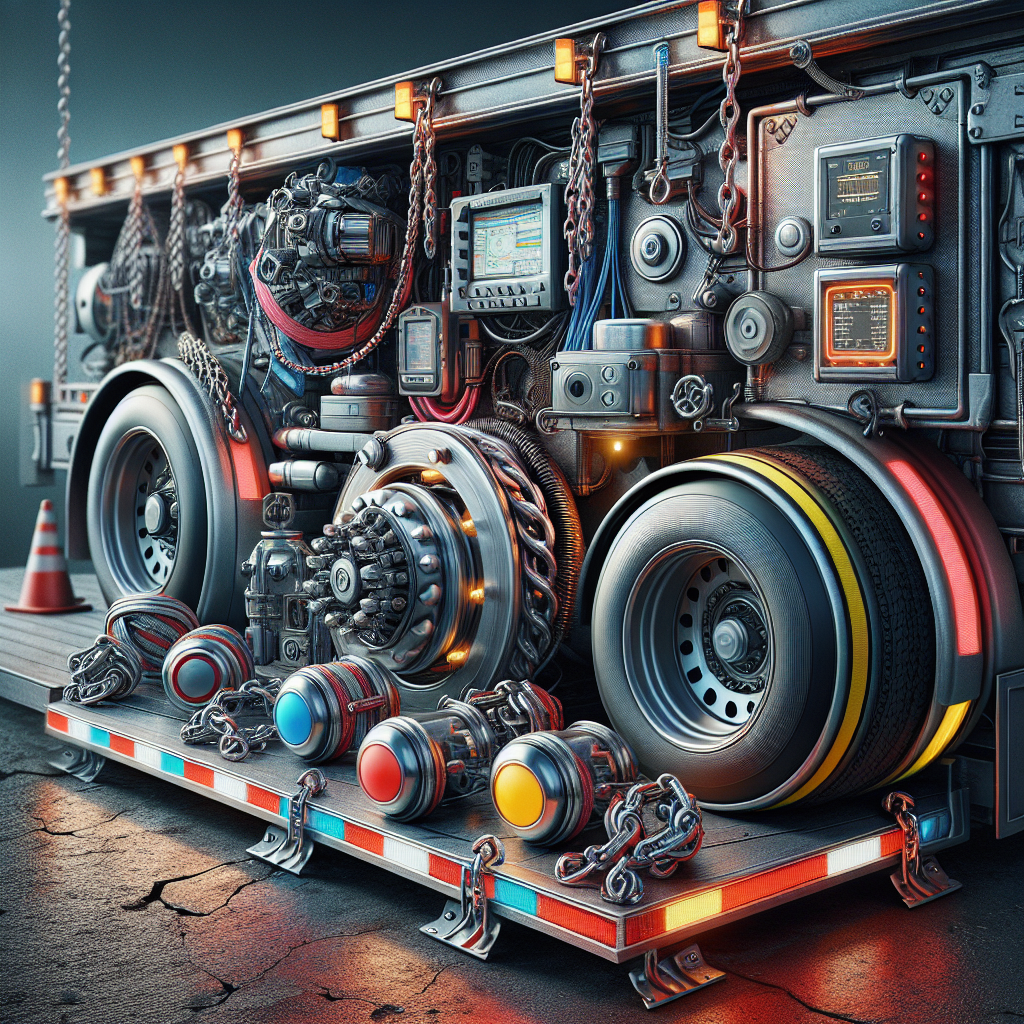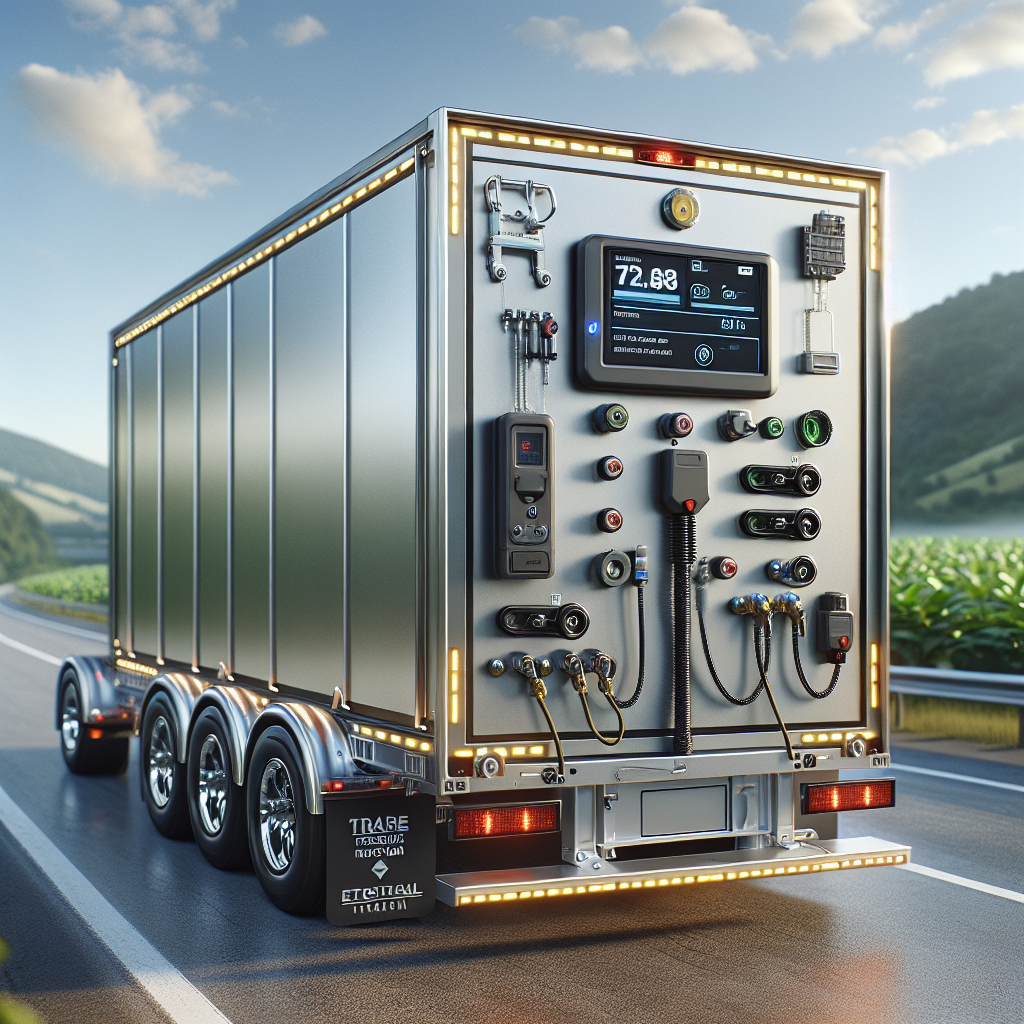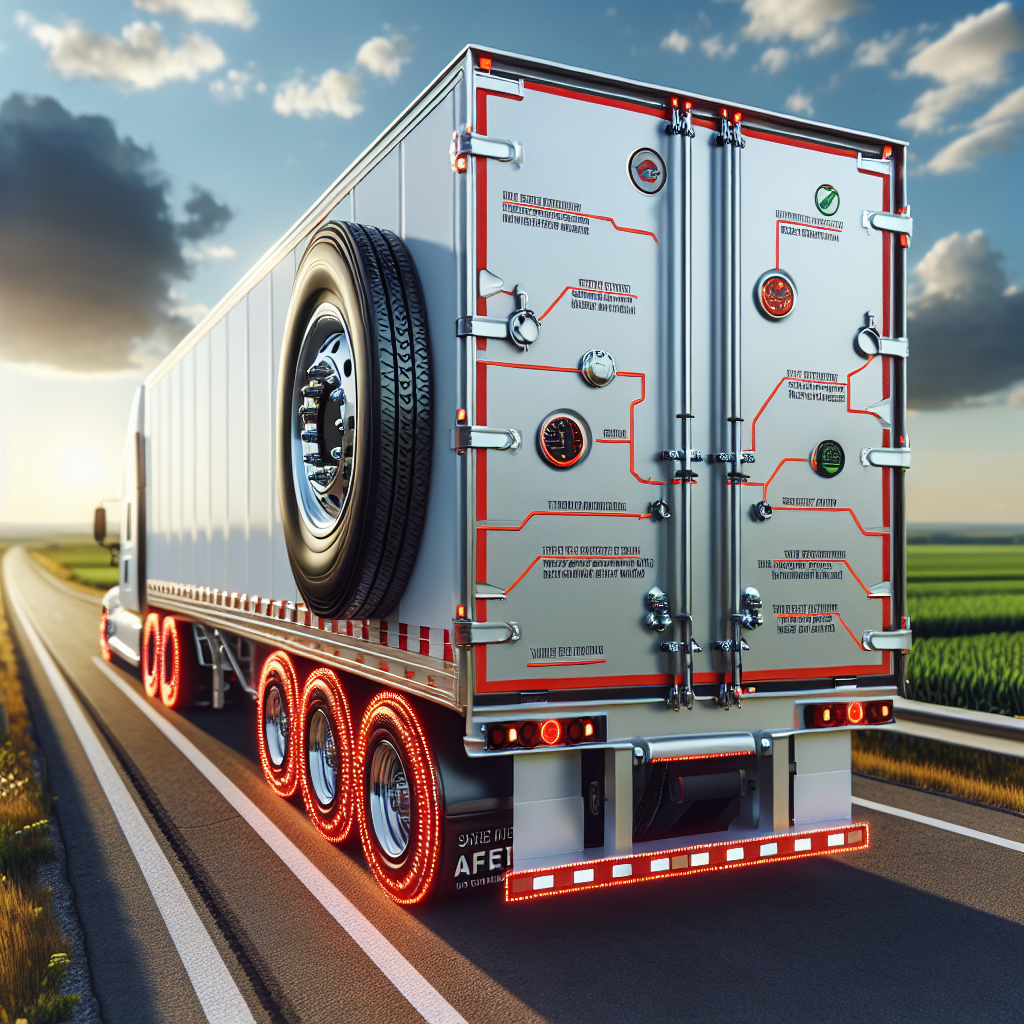When it comes to ensuring the safety and security of your trailer during transportation, understanding what safety devices must be on a trailer is crucial. A well-equipped trailer not only protects the goods being transported but also enhances the safety of those on the road. In recent years, advancements in technology have introduced various safety devices that can transform any trailer into a smart trailer, significantly reducing the risk of accidents and mechanical failures.
Some of the essential safety devices that should be considered include:
- Braking Systems: Ensuring your trailer has an effective braking system is vital. Electric or surge brakes can provide the necessary stopping power.
- Safety Chains: These are critical for keeping the trailer attached to the towing vehicle, even if the hitch fails.
- Reflective Tape: To enhance visibility, especially at night, reflective tape should be applied to the trailer.
- Tire Pressure Monitoring Systems: These systems alert the driver to potential tire issues before they escalate into dangerous situations.
- Axle Temperature Sensors: Monitoring axle temperature can prevent catastrophic failures caused by overheating.
By integrating these devices, trailer owners can significantly mitigate risks associated with trailer transport. Tow with peace of mind, knowing that trailerwatchdog is standing guard.
Importance of Safety Devices on Trailers

The importance of safety devices on trailers cannot be overstated, especially in today's fast-paced world of transportation. As trailers are used for various purposes, from hauling goods to transporting recreational vehicles, equipping them with the right safety features is essential for both the trailer's integrity and the safety of other road users.
First and foremost, safety devices help prevent accidents. A well-maintained trailer with working safety features significantly reduces the risk of mechanical failure, which is a leading cause of road accidents involving trailers. For instance, a functional braking system can be the difference between a safe stop and a disastrous collision.
In addition to preventing accidents, safety devices enhance compliance with legal regulations. Many jurisdictions require certain safety features on trailers, such as lights and reflectors. Failing to comply can lead to fines or, worse, liability in the event of an accident.
Moreover, safety devices can help protect valuable cargo. Utilizing features like cargo tie-downs and load covers ensures that goods remain secure during transit, minimizing the risk of damage or loss.
Ultimately, investing in safety devices is not just about compliance or damage prevention; it’s about fostering a culture of safety within the transportation industry. By prioritizing safety, trailer owners contribute to safer roads for everyone.
Mandatory Safety Equipment for Trailers
When discussing mandatory safety equipment for trailers, it is crucial to understand that these devices vary depending on the type of trailer and the jurisdiction in which it operates. However, certain essential safety items are universally recognized to enhance trailer safety.
- Braking System: A reliable braking system is fundamental. This includes both electric and surge brakes, which provide necessary stopping power, especially when carrying heavy loads.
- Safety Chains: Always equip your trailer with safety chains that can support the trailer's weight in case of a hitch failure. These chains should cross underneath the trailer tongue to prevent it from dropping to the ground.
- Reflectors and Lighting: Adequate lighting, including brake lights, turn signals, and reflective materials, is vital for visibility during nighttime or low-visibility conditions. Check that all lights are functioning properly before each trip.
- Breakaway Switch: This device automatically activates the trailer's brakes if it becomes disconnected from the tow vehicle, preventing runaway trailers from causing accidents.
- Tire Monitoring System: A tire pressure monitoring system (TPMS) is essential for ensuring that tires are properly inflated, which helps prevent blowouts and improves fuel efficiency.
- Fire Extinguisher: Depending on the cargo being transported, carrying a fire extinguisher can be vital for managing emergencies quickly.
These mandatory safety devices not only help in compliance with regulations but also significantly enhance the safety and reliability of trailer operations. Ensuring that your trailer is equipped with these items is a proactive step toward safer travels.
Optional Safety Enhancements for Trailers

In addition to the mandatory safety equipment for trailers, there are several optional safety enhancements that can further increase the safety and security of your trailer during transportation. While these enhancements may not be legally required, they can provide peace of mind and prevent accidents.
- Surge Brakes: Beyond standard braking systems, surge brakes can automatically apply brakes when the trailer pushes against the tow vehicle, offering an additional layer of safety, especially on steep inclines.
- Anti-Sway Technology: Installing anti-sway systems can help stabilize the trailer during windy conditions or when navigating turns, reducing the risk of rollovers.
- Load Stabilizers: Utilizing load stabilizers can help distribute weight evenly across the trailer, minimizing the chances of swaying or tipping while on the road.
- GPS Tracking Systems: GPS technology allows you to monitor your trailer's location in real-time, providing valuable data in case of theft or loss.
- Backup Cameras: Adding a backup camera can greatly enhance visibility when reversing, helping prevent collisions with obstacles or pedestrians.
- Wheel Chocks: These devices can prevent movement when parked on an incline, adding an extra layer of safety during loading and unloading.
Incorporating these optional safety enhancements into your trailer setup can significantly improve overall safety and operational efficiency, ensuring that you're prepared for any situation on the road.
Regular Maintenance of Trailer Safety Devices

Ensuring the safety of your trailer goes beyond simply installing the necessary safety devices; it also requires regular maintenance to keep everything in optimal working condition. Just like any vehicle, trailers need routine checks to ensure that all safety features function correctly and reliably.
Here are some essential maintenance practices to consider:
- Weekly Inspections: Conduct visual inspections of lights, brakes, and tires weekly. Look for signs of wear or damage that could compromise safety.
- Brake System Checks: Regularly test your brake system to ensure it responds effectively. If you notice any unusual sounds or functionality issues, have them checked by a professional.
- Tire Maintenance: Check tire pressure monthly and inspect tread depth. Proper inflation and tread depth are crucial for safe traction and handling on the road.
- Electrical System Inspections: Ensure that all electrical connections are secure and that lights are functioning properly. Replace any burned-out bulbs promptly to maintain visibility.
- Hitch and Coupler Checks: Regularly inspect the hitch and coupler for any signs of wear or damage. A secure hitch is vital for safe towing.
- Cleaning and Lubrication: Keep your trailer clean and lubricate moving parts to prevent rust and ensure smooth operation.
By committing to a regular maintenance schedule for your trailer's safety devices, you not only enhance safety but also prolong the lifespan of your equipment. This proactive approach can help prevent costly repairs and ensure peace of mind during every journey.
Conclusion on Trailer Safety Device Importance

In summary, the importance of safety devices on a trailer cannot be overstated. These devices play a crucial role in safeguarding not only the cargo being transported but also the driver, other road users, and the integrity of the trailer itself. From basic features like lights and brakes to advanced monitoring systems, each component contributes to a comprehensive safety framework.
As we've explored, ensuring these devices are functional through regular maintenance and timely inspections is essential for safe towing experiences. The implementation of modern technology—such as smart trailer monitoring systems—can provide real-time insights into axle temperatures and tire conditions, significantly reducing the risk of catastrophic failures.
By prioritizing the installation and maintenance of essential safety devices, you can confidently hit the road, knowing that you have taken the necessary precautions to protect both your load and your investment. Tow with peace of mind, knowing that trailerwatchdog is standing guard.








